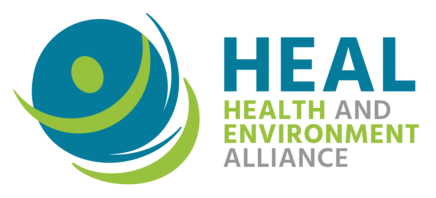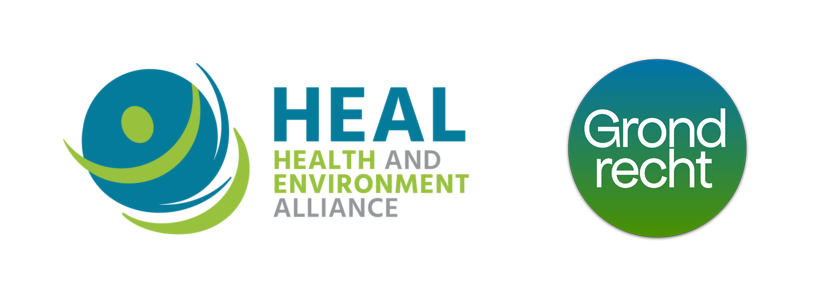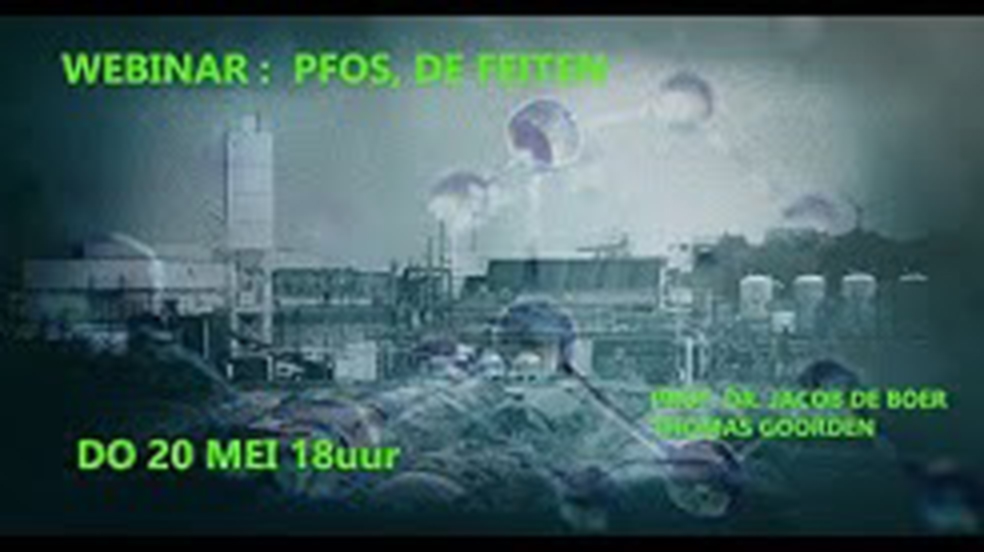

Nederlands
Français
English
Nederlands
Aan:
Zakia Khattabi
Minister van klimaat, leefmilieu, duurzame ontwikkeling en Green Deal
Frank Vandenbroucke
Vice-eersteminister en minister van sociale zaken en volksgezondheid
Brussel, 10 november 2021
Betreft:
De betrokkenheid van de Belgische federale regering inzake het adresseren van de PFAS-vervuiling rond Antwerpen.
Geachte minister Khattabi,
Geachte minister Vandenbroucke,
Wij schrijven u namens de Health and Environment Alliance (HEAL) en Grondrecht om te vragen naar de betrokkenheid van de Belgische federale regering inzake het adresseren van de vervuiling in Antwerpen en Zwijndrecht met hoog persistente per- en polyfluoroalkyl substanties (ook bekend als PFAS en ‘forever chemicals).
De Health and Environment Alliance is de toonaangevende Europese not-for-profit organisatie die aankaart wat het effect is van het milieu op gezondheid binnen de Europese Unie. Samen met meer dan 90 leden-organisaties verspreid over Europa, werken we om mee vorm te geven aan wetten en beleidsbeslissingen die de gezondheid van mens en planeet promoten. We beschermen degenen die het meest worden getroffen door vervuiling en creëren bewustzijn over de positieve invloed van milieuacties op onze gezondheid. Met ons programma over schadelijke chemicaliën, ijveren we niet enkel voor een ernstige inperking op PFAS maar ook voor een vervanging ervan in Europa, dit in het kader van het beschermen van de gezondheid en het voorkomen van ziektes.
Grondrecht is een collectief van bezorgde burgers dat werd opgericht naar aanleiding van de vervuiling van de site rond de 3M-fabriek in Zwijndrecht. Ze eisen transparantie over de schaal waarop de PFAS-vervuiling in Vlaanderen is verspreid en wat de impact hiervan is op de gezondheid van omwonenden en op de leefomgeving. Grondrecht ijvert ook voor de opkuis van de vervuilde sites en de implementatie van het principe ‘de vervuiler betaalt’.
Achtergrond
Zoals u weet, heeft de productie van de 3M-fabriek nabij Antwerpen gedurende verscheidene jaren geleid tot het dumpen, lozen en uitstoten van schadelijke PFAS. Met PFOS als meest beruchte in het hele omliggende gebied, waaronder de gemeente Zwijndrecht en de stad Antwerpen, waar samen meer dan een half miljoen mensen wonen.
De verontreiniging met PFOS trok de publieke aandacht nadat ze werd (her)ontdekt tijdens graafwerken in het kader van het infrastructuurproject Oosterweel. Volgens recente onthullingen in de media waren de lokale autoriteiten al in 2017 op de hoogte van het probleem.[1]
PFOS is misschien wel een van de meest beruchte leden van de PFAS-familie. De stof is opgenomen in de lijst van persistente organische verontreinigende stoffen (POP’s) van het Verdrag van Stockholm vanwege de extreme persistentie in het milieu, het vermogen tot bio-accumulatie (de stof is aangetroffen in dieren in het noordpoolgebied, ver van emissiebronnen) en voor transport over lange afstanden, evenals toxiciteit volgens dierexperimentele studies.[2] PFOS is geclassificeerd als een vermoedelijk reproductieve giftige stof (R1B) en een vermoedelijk carcinogeen (C2) volgens het Europese gevarenclassificatiesysteem.[3] Menselijke blootstelling aan de stof is in verband gebracht met zeer ernstige gezondheidseffecten, waaronder maar niet beperkt tot: interferenties met het hormonale systeem, effecten op het voortplantingssysteem en de ontwikkeling van het ongeboren kind, Ook op het immuunsysteem inclusief de reactie op vaccins en de ontwikkeling van bepaalde vormen van kanker (inclusief nier).[4]
De Internationale Federatie van Gynaecologie en Verloskunde heeft onlangs opgeroepen tot een onmiddellijke geleidelijke afschaffing van alle PFAS, met inbegrip van PFOS, en heeft daarbij de nadruk gelegd op de gezondheidsrisico’s die zij gedurende het hele leven inhouden, ook in kwetsbare ontwikkelingsfasen zoals de de vroege levensfasen in de baarmoeder en de adolescentie.[5]
Onze eisen
We nodigen de Belgische federale regering uit om bij te dragen aan de huidige Europese inspanningen rond regelgeving over PFAS, zoals geïllustreerd door het recente verzoek om van de PFAS-problematiek een agendapunt te maken op de Raad van ministers van leefmilieu van 6 oktober 2021.[6] Dit is een terechte erkenning van het feit dat “Het lijkt essentieel om zo snel mogelijk een krachtig beleid vast te stellen om de bovengenoemde milieuschade en nadelige gevolgen voor de gezondheid te voorkomen, maar ook om de lidstaten te ondersteunen bij het nemen van beschermende, herstel- en opruimmaatregelen”.
Er bestaat geen enkele twijfel over het feit dat gecoördineerde actie op EU-niveau absoluut noodzakelijk is om PFAS-vervuiling in de toekomst te voorkomen, blootstelling aan PFAS-chemicaliën zoveel mogelijk te vermijden, de vervuiling te remediëren, PFAS-gerelateerd afval aan te kaarten en de impact op de gezondheid van bewoners en de leefomgeving naar behoren te monitoren. In dit opzicht, is de huidige ontwikkeling van een Europa-brede inperking van alle niet-essentiële gebruiken van PFAS een belangrijke stap in de goede richting.
We zijn evenwel uitermate bezorgd dat er momenteel te weinig wordt gedaan door nationale overheden – inclusief de Belgische – om bestaande gevallen van PFAS-vervuiling aan te kaarten, terwijl men weet dat deze een impact hebben op de gezondheid van omwonenden en hun leefomgeving.
In België is de PFOS-vervuiling rond Antwerpen een realiteit die bevestigd werd door verschillende metingen in de omgeving sinds begin jaren ‘00. Het is alarmerend dat de eieren van kippen – binnen een straal van 15 kilometer rond de 3M-fabriek in Zwijndrecht – een gezondheidsrisico vormen, zoals werd vastgesteld door onderzoekers van de Universiteit van Antwerpen. In het bijzonder voor kinderen (door een hogere inname in verhouding tot hun gewicht).[7] In de zomer van 2021 werden er bloedstalen genomen door Grondrecht en geanalyseerd door onderzoekers van de Vrije Universiteit van Amsterdam. Er werden extreem hoge PFOS-concentraties gevonden in het bloed van omwonenden van de 3M-fabriek. Alle staalnames overschreden de recent aangepaste veiligheidsdrempel voor de som van PFOA, PFNA, PFHxS en PFOS van het Europees voedselagentschap (EFSA).[8] Deze alarmerende toestand werd nogmaals bevestigd door de recente publicatie van de resultaten van het Vlaams Agentschap Zorg en Gezondheid, eind oktober. Opnieuw werd een te hoge aanwezigheid van PFOS-waarden in het bloed vastgesteld bij meer dan de helft van de 800 geteste bewoners.[9]
De situatie vraag om dringende actie op drie niveaus, met name milieu- en gezondheidsmonitoring, opkuis van de site en het verantwoordelijk stellen van de vervuilende bedrijven.
We zijn ons ervan bewust dat er momenteel een Vlaamse onderzoekscommissie de verantwoordelijkheden binnen de regionale overheden en administraties onderzoekt en dat een administratieve procedure de omstandigheden nagaat in dewelke de Antwerpse fabriek verslag uitbracht over de uitstoot van afval gelinkt aan hun productie.
Desalniettemin zijn er bij ons weten, uitgezonderd de richtlijnen in verband met voedselconsumptie, weinig maatregelen genomen om de vervuiling en de gekende gezondheidsrisico’s waarmee omwonenden te maken krijgen onder de aandacht te brengen. De Belgische federale regering heeft reeds een grote bereidheid getoond om op Europees vlak de PFAS-problematiek grondig aan te pakken. Daarom horen wij graag van u of er reeds concrete maatregelen genomen zijn en/of welke maatregelen er in ontwikkeling zijn om de getroffen gemeenschappen in Antwerpen en Zwijndrecht beter te beschermen tegen de huidige toxische blootstelling. Gezien de huidige complexe Belgische staatstructuur en omdat vele bevoegdheden te verdeeld zijn onder de verschillende overheden zijn wij er van overtuigd dat dit op een federaal niveau moet aangepakt worden.
Daarom, door dit schrijven, willen we u vragen om ons op de hoogte te stellen van wat de plannen zijn van de federale overheid om:
- mee de getroffen gemeenschappen te ondersteunen in hun vraag naar transparantie en verantwoordelijkheid wat betreft de vervuiling en ook over de gerelateerde gezondheidsrisico’s, de schade aan het milieu en de leefomgeving.
- de garantie te bieden dat al de vervuilde gebieden worden gesaneerd en proper gemaakt, alsook de huidige werf en de reeds gerealiseerde projecten in het kader van de Oosterweelverbinding.
- de garantie dat er door een constante monitoring inzicht komt op de verdere verspreiding van vervuiling door metingen in water, lucht en bodem.
- de garantie dat getroffen gemeenschappen toegang krijgen tot proper water en veilige voeding.
- de garantie dat de aan de gezondheid gerelateerde lange-termijnrisico’s voor de omwonenden en ex-werknemers van de vervuilende bedrijven verder worden opgevolgd en gecontroleerd. Dit door grootschalige bio-monitoringsprojecten naar blootstelling aan PFAS. De Vlaamse regering maakt bovendien nog geen plannen om alle mogelijke getroffenen de kans te geven om zich te laten testen, zoals kinderen onder de 12 jaar, personen die verhuisd zijn maar wel lange tijd in Zwijndrecht of Antwerpen hebben gewoond en de bewoners van Antwerpen die op de rechteroever wonen. Ook wordt er geen lange termijn-monitoring gedaan naar de evolutie in de individuele gezondheidssituatie. We vragen daarom dat de federale regering om hier in te grijpen.
- de garantie dat het “vervuiler betaalt”-principe wordt gehanteerd tegenover de verantwoordelijke bedrijven, zodat zij verantwoordelijk blijven voor de geleden schade.
Wij bedanken u alvast voor uw spoedig antwoord op deze dringende vragen en zijn beschikbaar om hier verder over in gesprek te gaan.
Hoogachtend,
Genon K. JensenJonas Vernimmen
Executive DirectorCoördinator
Health and Environment Alliance (HEAL)GRONDRECHT
Contactpersonen:
Natacha Cingotti: natacha@env-health.org
Jonas Vernimmen: jonas@grondrecht.eu
- https://www.brusselstimes.com/news/belgium-all-news/174208/revealed-flemish-government-knew-about-pfos-problem-in-2017/
- Stockholm Convention, SC-4/17, Listing of perfluorooctane sulfonic acid, its salts and perfluorooctane sulfonyl fluoride, beschikbaar op http://chm.pops.int/Implementation/IndustrialPOPs/PFOS/Decisions/tabid/5222/Default..aspx, geconsulteerd op 7 oktober 2021.
- ECHA, Substance Infocard, https://echa.europa.eu/fr/substance-information/-/substanceinfo/100.015.618.
- Zie onder meer HBM4EU, Scoping Document for PFAS, 2019, Section 1.1.2 Hazardous Properties, https://www.hbm4eu.eu/wp- content/uploads/2019/03/HBM4EU_D4.9_Scoping_Documents_HBM4EU_priority_substances_v1.0- PFAS.pdf; pp. 1-2.
- FIGO, FIGO vraagt om het gebruik van PFAS globaal te schrappen, 25 mei 2021, https://www.figo.org/figo-calls-removal-pfas-global-use.
Zie ook de FIGO-UCSF-HEAL multilingual infographic on the health risks associated with PFAS exposure: https://www.env-health.org/how-pfas-chemicals-affect-women-pregnancy-and-human-development-health-actors-call-for-urgent-action-to-phase-them-out/. - “The need for a coordinated action against PFAS – Information from the Belgian delegation”, Information note, 24th September 2021, https://data.consilium.europa.eu/doc/document/ST-12150-2021-INIT/en/pdf , accessed 4th October 2021.
- Groffen Thimo, Lopez Antia Ana, D’ Hollander Wendy, Prinsen Els, Eens Marcel, Bervoets Lieven. Perfluoroalkylated acids in the eggs of great tits near a fluorochemical plant in Flanders, Belgium https://doi.org/10.1016/J.ENVPOL.2017.05.007.
See also: https://www.brusselstimes.com/news/belgium-all-news/173456/3m-pollution-pfos-eggs-hatched- within-15-km-of-factory-in-antwerp-pose-health-risks-says-uantwerp/. - Grondrecht, Persbericht bloedonderzoek Zwijndrecht, 4 augustus 2021,
http://rggtvqo.cluster031.hosting.ovh.net/facts/actueel/persbericht-bloedonderzoek-zwijndrecht/. - Agentschap Zorg en Gezondheid, Bloedonderzoek toont hoge waarden van PFOS bij meer dan de helft van de deelnemers – no-regretmaatregelen worden uitgebreid, 26 oktober 2021, https://www.zorg-en-gezondheid.be/bloedonderzoek-toont-hoge-waarden-van-pfos-bij-meer-dan-de-helft-van-de-deelnemers-%E2%80%93-no.
Français
À:
Zakia Khattabi
Ministre du Climat, de l’Environnement, du Développement durable et du Green Deal
Frank Vandenbroucke
Vice-Premier Ministre, Ministre pour les Affaires sociales et la Santé publique
Bruxelles, le 10 Novembre 2021
Objet:
Implication du gouvernement fédéral belge dans la gestion de la contamination par les PFAS autour d’Anvers.
Madame la Ministre,
Monsieur le Ministre,
Au nom de l’Alliance pour la Santé et l’Environnement (Health and Environment Alliance – HEAL) et Grondrecht, nous nous adressons à vous afin de solliciter l’implication du gouvernement fédéral dans la gestion de la réponse à la contamination de la zone d’Anvers et Zwijndrecht par des polluants per- et polyfluoroalkylés hautement persistants (également appelés PFAS ou « polluants éternels »).
L’Alliance pour la Santé et l’Environnement (HEAL) est la principale organisation à but non lucratif s’intéressant à la manière dont l’environnement affecte la santé humaine dans l’Union européenne (UE). Avec nos quelques 90 organisations membres, nous contribuons à l’élaboration de lois et de politiques publiques qui promeuvent la santé planétaire et humaine et protègent les personnes les plus touchées par la pollution, ainsi qu’à une meilleure prise de conscience des bénéfices de l’action environnementale sur la santé. A travers notre programme de travail sur les substances chimiques nocives, nous soutenons l’élaboration de restrictions larges des composés PFAS ainsi que leur substitution à travers l’Europe pour une meilleure protection de la santé et la prévention des maladies.
Grondrecht est un collectif de riverains engagés, formé en réponse à la pollution des sites localisés autour de l’usine 3M dans la zone d’Anvers et Zwijndrecht, pour exiger la transparence à propos de l’ampleur de la contamination aux composés PFAS en Flandre et ses conséquences pour la santé des communautés et de l’environnement proches, la dépollution des sites contaminés, et l’application du principe pollueur-payeur.
Contexte
Comme vous le savez, l’exploitation de l’usine 3M près d’Anvers a eu pour conséquences le déversement et l’émission de polluants PFAS nocifs ainsi que la décharge de déchets leur étant liés pendant plusieurs années – le plus connu d’entre eux étant le PFOS – à travers la zone environnante, y compris la municipalité de Zwijndrecht et la ville d’Anvers, dont la population combinée s’élève à plus d’un million de personnes.
La contamination au PFOS a été révélée publiquement suite à sa (re)-découverte durant les travaux d’excavation qui ont eu lieu dans le contexte de la mise en œuvre du projet d’infrastructures de la liaison Oosterweel. D’après des révélations récentes dans la presse, les autorités locales auraient été informées du problème depuis au moins l’année 2017.[1]
Le PFOS est sans doute l’un des membres les plus tristement célèbres de la famille des composés PFAS. La substance est listée comme Polluant organique persistant (POP) sous la Convention de Stockholm à cause de son extrême persistance dans l’environnement, son potentiel de bioaccumulation (la substance a été retrouvée dans les animaux en Arctique, très loin des sources d’émission) et de transport à longue distance, ainsi que sa toxicité d’après les études animales expérimentales.[2] Le PFOS est classifié comme présumé toxique à la reproduction (R1B) et cancérogène suspecté (C2) sous le système européen de classification des dangers.[3] L’exposition humaine à la substance a été associée à des effets sur la santé très sévères, qui incluent mais ne sont pas limités à : des interférences avec le système hormonal, des effets sur le système reproducteur et le développement des enfants lors de la gestation, sur le système immunitaire y compris la réponse aux vaccins, et le développement de certains cancers (comme celui du rein).[4]
La Fédération internationale des Gynécologues et Obstétriciens a récemment lancé un appel public à l’élimination de tous les PFAS, notamment les PFOS, en insistant sur les risques sur la santé que ces composés posent tout au long de la vie, y compris durant des fenêtres de développement vulnérables comme le tout début de la vie in utero, l’adolescence, ou la grossesse.[5]
Nos demandes
Nous nous réjouissons de la volonté affichée par le gouvernement fédéral belge de contribuer aux efforts européens actuels pour mieux réglementer les composés PFAS, comme illustrée par la récente demande de mise à l’agenda des PFAS au conseil européen du 6 Octobre 2021.[6] Cette dernière reconnaît avec justesse qu ’« il apparait essentiel d’adopter des politiques fortes le plus tôt possibles pour éviter les dommages environnementaux cités ci-dessus et des effets nocifs sur la santé, mais aussi pour soutenir les Etats Membres dans la prise de mesures de protection, de remédiation et de dépollution».
Il ne fait aucun doute qu’une action coordonnée au niveau européen est absolument nécessaire pour empêcher de nouvelles pollutions aux PFAS dans le futur, minimiser le plus possible les expositions à ces substances, remédier à la pollution, traiter les déchets qui leur sont liés, et surveiller de manière adéquate les impacts pour la santé et l’environnement. De ce point de vue, le développement en cours d’une restriction européenne couvrant le groupe entier des PFAS et tous les usages dits non-essentiels représente une avancée majeure.
Nous constatons cependant avec inquiétude que très peu d’actions sont actuellement mises en place par les autorités nationales, notamment les autorités belges, pour répondre aux cas existants de pollution aux PFAS, dont les impacts sur la santé sur les communautés locales et leur environnement sont déjà connus.
En Belgique, la pollution au PFOS autour d’Anvers est une réalité, comme l’ont confirmé les mesures de PFOS prises dans les sols en 2018. De manière choquante, les œufs produits dans un rayon de 15 kilomètres autour de l’usine 3M d’Anvers ont été considérés comme posant des risques pour la santé par les chercheurs de l’Université d’Anvers, spécifiquement pour les enfants (à cause de leur potentiel d’ingestion plus grand par rapport à leur poids).[7] Durant l’été 2021, des analyses organisées par Grondrecht et réalisées par des chercheurs de l’Université libre d’Amsterdam ont révélé des concentrations excessivement hautes de PFOS dans le sang des riverains, et notamment pour tous les échantillons, un dépassement de la limite sanitaire pour la somme des PFOA, PFNA, PFHxS et PFOS récemment mise à jour par l’Autorité européenne de Sécurité des Aliments (EFSA).[8] Le caractère alarmant de la situation a de nouveau été confirmé lors de la récente publication des résultats des analyses de l’Agence flamande du Soin et de la Santé (Agentschap Zorg en Gezondheid) à la fin du mois d’Octobre, qui ont révélé des niveaux de PFOS excessifs dans le sang de plus de la moitié des 800 citoyens testés.[9]
La situation exige des actions urgentes à trois niveaux principaux, à savoir la surveillance environnementale et sanitaire, la décontamination du site, et la responsabilité des pollueurs vis-à-vis des riverains et des autorités.
Nous sommes conscients qu’une enquête parlementaire flamande est actuellement en train d’enquêter sur la chaîne des responsabilités au sein du gouvernement et de l’administration régionales et qu’une procédure administrative analyse quant à elle les conditions dans lesquelles l’usine d’Anvers a communiqué à propos des déchets émis dans le cadre de ses opérations.
Cependant, à ce jour et à notre connaissance, très peu de mesures ont été mises en place pour gérer la pollution elle-même dans le but de répondre aux risques de santé connus et présumés auxquels font face les communautés environnantes, mis à part des lignes directives adaptées pour la consommation alimentaire. Etant donné le niveau d’engagement affiché par les autorités fédérales belges par rapport au défi que pose la pollution aux PFAS au niveau européen, nous nous tournons vers vous pour savoir quelles mesures sont actuellement envisagées et/ou en cours de développement afin de remédier aux conséquences réelles de la situation pour les communautés de la zone d’Anvers et de Zwijndrecht. Nonobstant la structure institutionnelle complexe des institutions belges et le partage des responsabilités entre les niveaux régionaux et national, le caractère très sérieux de la situation et ses conséquences potentiellement considérables nous apparaissent exiger l’implication des institutions fédérales.
C’est pourquoi, avec cette lettre, nous souhaiterions vous demander ce que vos ministères respectifs envisagent de faire afin de:
- Répondre à et soutenir l’exigence de transparence et de responsabilité des communautés locales à propos de la pollution et de ses conséquences sanitaires et environnementales;
- Garantir la cartographie précise des sites exigeant une décontamination ainsi que la mise en place effective de celle-ci, y compris sur le site où le projet Osterweel est actuellement en cours de développement;
- Garantir la surveillance adéquate de l’évolution de la contamination environnementale (à travers des mesures régulières dans l’eau et les sols);
- Garantir que toutes les mesures existantes possibles soient mises en application pour assurer l’accès des communautés locales à de l’eau et de l’alimentation propres et sûres;
- Assurer la surveillance adéquate des risques de santé liés à l’exposition à long-terme au PFOS pour les communautés environnantes (y compris à travers une biosurveillance régulière et large pour tous les riverains ainsi qu’un suivi médical pour les plus à risques) ainsi que pour les travailleurs des entreprises concernées. A l’heure actuelle, le gouvernement flamand n’a pas l’intention de proposer des tests personnalisés pour l’ensemble des riverains concernés (par exemple pour les enfants, les riverains ayant quitté la zone, les habitants d’Anvers) ou un suivi médical personnalisé à long-terme. Ce manque d’action nous pousse à demander l’implication du niveau fédéral.
- Garantir l’application du principe pollueur-payeur, à savoir que les entreprises responsables de la pollution en premier lieu soient tenues légalement et financièrement responsables.
Nous vous remercions pour vos réponses sur ces questions importantes et urgentes et nous apprécierions l’opportunité d’échanger avec vous plus en détails lors d’une réunion à votre meilleure convenance.
Nous vous prions d’agréer, Madame la Ministre, Monsieur le Ministre, l’expression de nos salutations distinguées.
Genon K. JensenJonas Vernimmen
Directrice exécutiveCoordinateur
Health and Environment Alliance (HEAL)GRONDRECHT
Contacts:
Natacha Cingotti: natacha@env-health.org
Jonas Vernimmen: jonas@grondrecht.eu
- https://www.brusselstimes.com/news/belgium-all-news/174208/revealed-flemish-government-knew-about-pfos-problem-in-2017/
- Convention de Stockholm, SC-4/17, Listing de l’acide perfluorooctanesulfonique, ses sels et fluorure de perfluorooctane sulfonyle, disponible sur http://chm.pops.int/Implementation/IndustrialPOPs/PFOS/Decisions/tabid/5222/Default..aspx, consulté le 7 Octobre 2021.
- ECHA, fiche d’information substance, https://echa.europa.eu/fr/substance-information/-/substanceinfo/100.015.618.
- Voir par example, HBM4EU, Document de scoping pour les PFAS, 2019, Section 1.1.2 Propriétés de danger, https://www.hbm4eu.eu/wp- content/uploads/2019/03/HBM4EU_D4.9_Scoping_Documents_HBM4EU_priority_substances_v1.0- PFAS.pdf; pp. 1-2.
- FIGO, FIGO calls for removal of PFAS from global use, 25 mai 2021, https://www.figo.org/figo-calls-removal-pfas-global-use.
Voir également l’infographie multilingue FIGO-UCSF-HEAL sur les risques de santé associés à l’exposition aux PFAS: https://www.env-health.org/how-pfas-chemicals-affect-women-pregnancy-and-human-development-health-actors-call-for-urgent-action-to-phase-them-out/. - Conseil européen, “The need for a coordinated action against PFAS – Information from the Belgian delegation”, note d’information, 24 Septembre 2021, https://data.consilium.europa.eu/doc/document/ST-12150-2021-INIT/en/pdf, consulté le 4 Octobre 2021 et traduit de l’anglais.
- Groffen Thimo, Lopez Antia Ana, D’ Hollander Wendy, Prinsen Els, Eens Marcel, Bervoets Lieven. Perfluoroalkylated acids in the eggs of great tits near a fluorochemical plant in Flanders, Belgium https://doi.org/10.1016/J.ENVPOL.2017.05.007.
Voir également: https://www.brusselstimes.com/news/belgium-all-news/173456/3m-pollution-pfos-eggs-hatched- within-15-km-of-factory-in-antwerp-pose-health-risks-says-uantwerp/. - Grondrecht, Persbericht bloedonderzoek Zwijndrecht, 4 Août 2021,
http://rggtvqo.cluster031.hosting.ovh.net/facts/actueel/persbericht-bloedonderzoek-zwijndrecht/. - Agentschap Zorg en Gezondheid, Bloedonderzoek toont hoge waarden van PFOS bij meer dan de helft van de deelnemers – no-regretmaatregelen worden uitgebreid, 26 Octobre 2021, https://www.zorg-en-gezondheid.be/bloedonderzoek-toont-hoge-waarden-van-pfos-bij-meer-dan-de-helft-van-de-deelnemers-%E2%80%93-no.
English
To:
Zakia Khattabi
Minister for Climate, Environment, Sustainable Development and Green Deal
Frank Vandenbroucke
Deputy Prime Minister, Minister for Social Affairs and Public Health
Brussels, November 10th 2021
RE:
Belgian federal government involvement regarding the addressing of the PFAS contamination around Antwerp.
Dear Minister Khattabi,
Dear Minister Vandenbroucke,
We are writing you on behalf of the Health and Environment Alliance (HEAL) and Grondrecht, in order to ask for the involvement of the federal government in addressing the contamination of the area of Antwerp and Zwijndrecht by highly persistent per- and polyfluoroalkyl substances (also referred to as PFAS or “forever chemicals”).
The Health and Environment Alliance is the leading European not-for-profit organisation addressing how the natural and built environments affect health in the European Union. Together with our over 90 member organisations around Europe, we work to shape laws and policies that promote planetary and human health, protect those most affected by pollution, and raise awareness on the benefits of environmental action for health. Through our programme on harmful chemicals, we promote large restrictions and substitutions of PFAS across Europe in view of health protection and disease prevention.
Grondrecht is a collective of concerned citizens that formed in response to the pollution of the sites surrounding the 3M factory in the area of Antwerp and Zwijndrecht in order to demand transparency about the scale of PFAS-contamination in Flanders and its related consequences for the health of the nearby communities and the environment, clean-up of the contaminated sites and the implementation of the polluter-pays principle.
Background
As you are aware, the operation of the 3M factory near Antwerp has resulted in the dumping, discharge and emission of harmful PFAS for several years, with PFOS being the most notorious one, all across the surrounding area, including the municipality of Zwijndrecht and city of Antwerp, which together house over half a million people.
PFOS-contamination caught public attention after it was (re)discovered during the excavation work that took place in the context of the Oosterweel infrastructure project. According to recent media reveals, local authorities appear to have been informed about the problem already back in 2017.[1]
PFOS is perhaps one of the most infamous members of the PFAS family. The substance is listed as a Persistent Organic Pollutant (POP) under the Stockholm Convention due to its extreme persistence in the environment, its potential for bioaccumulation (the substance has been found in Arctic animals, far from emission sources) and for long-range transport, as well as toxicity according to animal experimental studies.[2] PFOS is classified as a presumed reproductive toxicant (R1B) and a suspected carcinogen (C2) under the European hazard classification system.[3] Human exposure to the substance has been associated with very severe health outcomes, which include but are not limited to: interferences with the hormonal system, effects on the reproductive system and the development of the unborn child, on the immune system including the response to vaccines, the development of certain cancers (including kidney).[4]
The International Federation of Gynecologists and Obstetricians recently called for an immediate phase-out of all PFAS, including PFOS, stressing the health risks they pose throughout the lifetime, including in vulnerable development windows such as early-life stages in utero, adolescence, or pregnancy.[5]
Our requests
We welcome the Belgian federal government willingness to contribute to current European regulatory efforts on PFAS, as illustrated by the recent request to address the issue of PFAS as part of the agenda points of the recent council of Environment Ministers (October 6th 2021).[6] The latter rightly acknowledges that “it seems essential to adopt strong policies as soon as possible to avoid the above environmental damage and adverse health impacts, but also to support Member States in taking protective, remedial and clean-up measures”.
There is no doubt that coordinated action at EU level is absolutely necessary to prevent future PFAS pollution, minimise exposure to PFAs chemicals as much as possible, remediate pollution, address PFAS-originating waste, and duly monitor impacts for the health of population and the environment. In this regard, the current development of a Europe-wide group restriction of all non-essential uses of PFAS is an important step forward.
We are however concerned that very little is currently being done by national authorities, including Belgian ones, to address existing PFAS pollution cases, which are known to already impact the health of local communities and their environment.
In Belgium, PFOS pollution around Antwerp is a reality, as confirmed by the measurement of PFOS in the soil in 2018. Shockingly, eggs hatched within a 15-kilometer radius of the 3M factory of Antwerp were found to pose health risks by researchers of the University of Antwerp, especially for children (due to higher ingestion relative to their weight).[7] In the summer 2021, sampling organized by Grondrecht and carried out by researchers of the Free University of Amsterdam found excessively high PFOS concentrations in the blood of local residents, with all samples exceeding the recently updated safety threshold for the sum of PFOA, PFNA, PFHxS and PFOS of the European Food Safety Agency (EFSA).[8] This alarming situation was again confirmed by the recent publication of the results of the analysis of the Flemish Care and Health Agency (Agentschap Zorg en Gezondheid) at the end of October, which find excessive PFOS levels in the blood of more than half of the 800 citizens tested.[9]
The situation requests urgent action on three main levels, namely environmental and health monitoring, clean-up of the site, and accountability of the polluting companies towards residents and authorities.
We are aware that a Flemish parliamentary enquiry is currently investigating the chain of responsibilities within the regional government and administration and that an administrative procedure is looking into the conditions, in which the Antwerp factory reported for the waste emitted in relation to its operations.
However, to date and as far as we are aware, very few measures have been taken to address the pollution itself in order to cater for the known and presumed health risks encountered by the surrounding communities, besides adapted heath guidelines for food consumption. Given the level of commitment displayed by the Belgian federal authorities with regards to the challenge of PFAS pollution at the European level, we would like to enquire about measures currently being considered and/or developed to address the real-life consequences of the situation of communities in the area of Antwerp and Zwijndrecht. Notwithstanding the complex institutional set-up of the Belgian institutions and split of responsibilities between the regional and national levels, we believe that the seriousness of the situation and its potential far-reaching impacts require the involvement of the federal institutions.
Therefore, with this letter, we would like to ask you what your respective ministries are planning to do in order to:
- Respond to and support the local communities’ request for transparency and accountability about the pollution and the related health and environmental consequences;
- Guarantee the precise mapping of the sites requesting cleanup and their effective decontamination, including the site where the Oosterweel-project is currently being developed;
- Ensure the due monitoring of the evolution of environmental contamination (through regular measurements in water and soil);
- Guarantee that every possible measure is being implemented to ensure that local communities can have access to clean and safe water and food;
- Ensure the due monitoring of the health-related risks of long-term exposure to PFOS for surrounding communities (including through regular large-scale human biomonitoring for all nearby residents and health follow up for those most at risk) and workforces of the companies concerned. Currently, the Flemish government does not plan to provide individualized testing for all (e.g. for children, for people who have moved out of the area, for inhabitants of Antwerp) and long-term monitoring of individual health situations. Because of this lack of action, we appeal to the federal government to step in.
- Guarantee that the polluter-pays principle is being implemented, namely that the companies responsible for the pollution in the first place are legally and financially kept accountable.
We look forward to your responses on these important and urgent questions and we would welcome the opportunity to exchange with you in details during a meeting at your earliest convenience.
Yours sincerely,
Genon K. JensenJonas Vernimmen
Executive DirectorCoordinator
Health and Environment Alliance (HEAL)GRONDRECHT
Contacts:
Natacha Cingotti: natacha@env-health.org
Jonas Vernimmen: jonas@grondrecht.eu
- https://www.brusselstimes.com/news/belgium-all-news/174208/revealed-flemish-government-knew-about-pfos-problem-in-2017/
- Stockholm Convention, SC-4/17, Listing of perfluorooctane sulfonic acid, its salts and perfluorooctane sulfonyl fluoride, available from http://chm.pops.int/Implementation/IndustrialPOPs/PFOS/Decisions/tabid/5222/Default.aspx, accessed October 7th 2021.
- ECHA, Substance Infocard, https://echa.europa.eu/fr/substance-information/-/substanceinfo/100.015.618.
- See for instance, HBM4EU, Scoping Document for PFAS, 2019, Section 1.1.2 Hazardous Properties, https://www.hbm4eu.eu/wp- content/uploads/2019/03/HBM4EU_D4.9_Scoping_Documents_HBM4EU_priority_substances_v1.0- PFAS.pdf; pp. 1-2.
- FIGO, FIGO calls for removal of PFAS from global use, May 25th 2021, https://www.figo.org/figo-calls-removal-pfas-global-use.
See also joint FIGO-UCSF-HEAL multilingual infographic on the health risks associated with PFAS exposure: https://www.env-health.org/how-pfas-chemicals-affect-women-pregnancy-and-human-development-health-actors-call-for-urgent-action-to-phase-them-out/. - “The need for a coordinated action againt PFAS – Information from the Belgian delegation”, Information note, September 24th 2021, https://data.consilium.europa.eu/doc/document/ST-12150-2021-INIT/en/pdf, accessed October 4th 2021.
- Groffen Thimo, Lopez Antia Ana, D’ Hollander Wendy, Prinsen Els, Eens Marcel, Bervoets Lieven. Perfluoroalkylated acids in the eggs of great tits near a fluorochemical plant in Flanders, Belgium https://doi.org/10.1016/J.ENVPOL.2017.05.007.
See also: https://www.brusselstimes.com/news/belgium-all-news/173456/3m-pollution-pfos-eggs-hatched- within-15-km-of-factory-in-antwerp-pose-health-risks-says-uantwerp/. - Grondrecht, Persbericht bloedonderzoek Zwijndrecht, August 4th 2021,
http://rggtvqo.cluster031.hosting.ovh.net/facts/actueel/persbericht-bloedonderzoek-zwijndrecht/. - Agentschap Zorg en Gezondheid, Bloedonderzoek toont hoge waarden van PFOS bij meer dan de helft van de deelnemers – no-regretmaatregelen worden uitgebreid, October 26th 2021, https://www.zorg-en-gezondheid.be/bloedonderzoek-toont-hoge-waarden-van-pfos-bij-meer-dan-de-helft-van-de-deelnemers-%E2%80%93-no.



